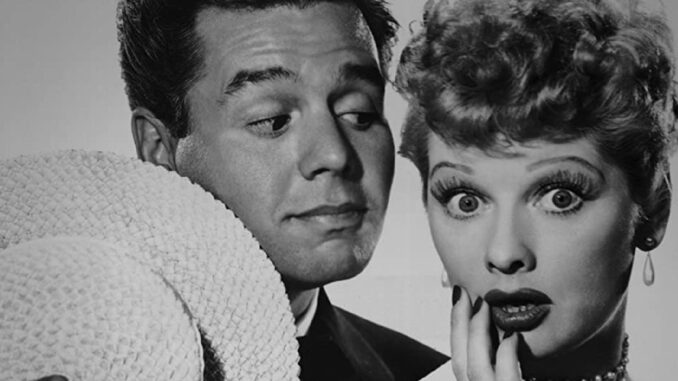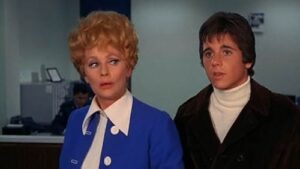
Introduction
Lucille Ball, the undisputed queen of television comedy, made history with I Love Lucy. But what many fans don’t know is that when she launched her spin-off series, she inserted a strange and highly personal clause into the contract—a ‘killswitch’ that gave her unprecedented control. This clause wasn’t just a legal formality; it was a deeply personal decision rooted in her life and career.
In this article, we’ll dive into the fascinating world of Lucille Ball’s spin-off series, explore the reasons behind this unusual clause, and uncover how it impacted the series’ production and legacy.
What Was the I Love Lucy Spin-Off?
The I Love Lucy spin-off wasn’t just a continuation of the beloved sitcom; it was a reimagining of Lucy’s comedic genius. After I Love Lucy ended in 1957, Lucille Ball transitioned into The Lucy-Desi Comedy Hour, which retained much of the original cast but offered a new format.
Why Did Lucille Ball Create a Spin-Off?
Lucille Ball and Desi Arnaz, her husband and co-star, wanted to continue working together despite the challenges in their personal lives. The spin-off allowed them to keep their creative partnership alive while also giving them more flexibility in storytelling.
The Birth of the ‘Killswitch’ Clause
One of the most intriguing aspects of this spin-off was the inclusion of a unique contract clause. Lucille Ball insisted on a provision that would allow her to end the show at any time, for any reason. This ‘killswitch’ was highly unusual in Hollywood, where networks typically held the power to cancel or renew shows.
Why Was the Clause So Personal?
Lucille Ball’s decision to include this clause was deeply tied to her personal life. By the time the spin-off aired, her marriage to Desi Arnaz was on the rocks. She wanted the ability to pull the plug on the series if their off-screen tensions became unbearable or if she felt the show was no longer creatively fulfilling.
How Did the Clause Affect Production?
The existence of the ‘killswitch’ clause created a unique dynamic on set. Writers, directors, and cast members knew that the show’s fate rested entirely in Lucille Ball’s hands. This led to a mix of creative freedom and underlying tension.
The Network’s Reaction to the Clause
CBS, the network behind the series, was initially hesitant about granting Lucille Ball such power. However, her star power and proven track record made it nearly impossible for them to refuse her demands.
The Role of Desi Arnaz in the Clause
Desi Arnaz, ever the savvy businessman, reportedly supported the clause. He understood Lucille’s concerns and wanted to ensure she felt secure in continuing their professional partnership.
Did Lucille Ball Ever Use the Killswitch?
While the clause gave Lucille Ball the authority to end the show at will, she never officially invoked it. However, her personal struggles and eventual divorce from Desi Arnaz contributed to the natural conclusion of The Lucy-Desi Comedy Hour in 1960.

The Clause as a Reflection of Lucille Ball’s Power
Inserting such a clause into a contract was a bold move that underscored Lucille Ball’s influence in Hollywood. At a time when few women wielded significant power in the entertainment industry, she set a precedent for creative control.
The Legacy of the ‘Killswitch’ Clause
The clause didn’t just protect Lucille Ball’s interests; it became a symbol of her determination to prioritize her well-being and artistic integrity. It also highlighted the importance of having control over one’s creative work, a concept that resonates with artists to this day.
Comparing Lucille Ball’s Clause to Modern Practices
Today, many creators negotiate similar clauses to maintain control over their projects. Lucille Ball’s forward-thinking approach paved the way for such agreements, proving she was ahead of her time.
What Can Creators Learn from Lucille Ball?
Lucille Ball’s story offers valuable lessons for modern creators:
- Know Your Worth: Lucille Ball understood her value and wasn’t afraid to demand control.
- Protect Your Vision: The clause ensured that her creative vision wouldn’t be compromised.
- Balance Personal and Professional Life: She recognized the importance of prioritizing her mental health and personal life.
Behind-the-Scenes Stories from the Spin-Off
The spin-off wasn’t without its challenges. From on-set disagreements to the pressures of maintaining high ratings, the production faced its fair share of drama.
How Fans Reacted to the Spin-Off
While The Lucy-Desi Comedy Hour wasn’t as iconic as I Love Lucy, it still garnered a loyal fanbase. The show’s mix of comedy and heartfelt moments resonated with viewers, even as it marked the end of an era for Lucille Ball and Desi Arnaz.
The End of the Spin-Off Era
After the conclusion of The Lucy-Desi Comedy Hour, Lucille Ball continued to dominate television with other successful projects. However, the spin-off remains a fascinating chapter in her career, largely due to the mysterious ‘killswitch’ clause.
Conclusion
Lucille Ball’s I Love Lucy spin-off wasn’t just another TV show—it was a testament to her resilience, creativity, and determination to control her narrative. The strange and personal ‘killswitch’ clause serves as a reminder of her influence and the lengths she went to protect her vision.
Lucille Ball’s legacy continues to inspire creators, proving that sometimes, the most unconventional decisions lead to the most iconic results.
FAQs
1. What was the purpose of the ‘killswitch’ clause in Lucille Ball’s spin-off contract?
The clause allowed Lucille Ball to end the show at any time, ensuring she had full control over the series’ fate.
2. Did Lucille Ball ever invoke the ‘killswitch’ clause?
No, she never officially used the clause, but it gave her peace of mind during a turbulent period in her life.
3. How did the clause impact the production of the spin-off?
It created a unique dynamic, with everyone aware that Lucille Ball held the ultimate power over the show’s continuation.
4. What made The Lucy-Desi Comedy Hour different from I Love Lucy?
The spin-off featured a new format with longer episodes and more guest stars, offering a fresh take on Lucy’s comedic brilliance.
5. How did Lucille Ball’s decision influence modern creators?
Her insistence on creative control set a precedent for artists to prioritize their vision and negotiate for better terms in their contracts.